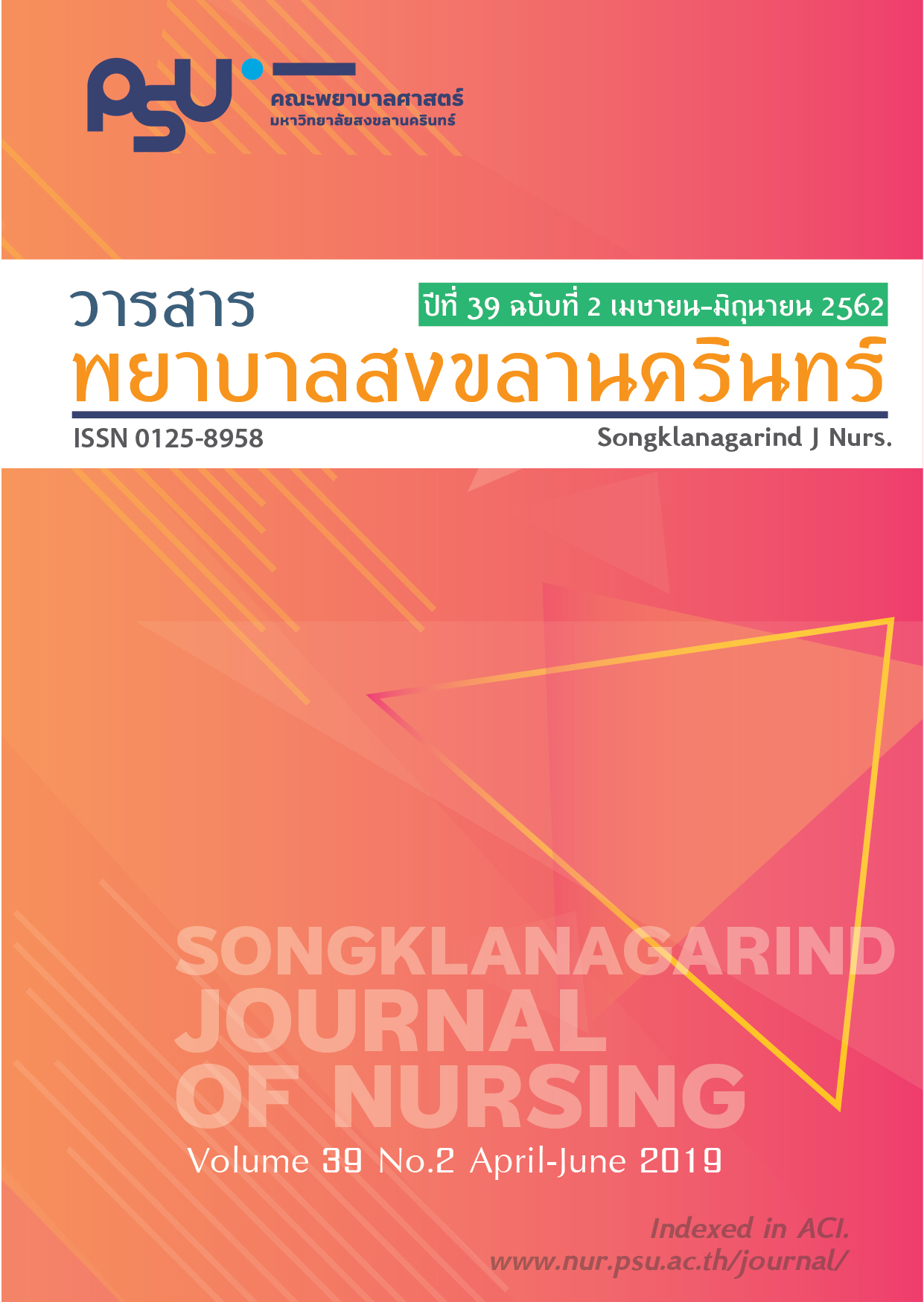Experience of Nephrology Nurses’ Providing Counselingon Sexual Issues for Patients with Chronic Kidney Disease
Main Article Content
Abstract
This qualitative study aimed to explain the experience of nephrology nurses’ providing counseling on sexual issues for chronic kidney disease (CKD) patients. The participants included 20 nephrology nurses. Data were collected by using individual in-depth interview between April and June 2016. Data were analyzed using van Manen’s method.
The findings revealed the experience of nephrology nurses’ providing counseling on sexual issues for CKD patients consisted of four themes. These themes included: 1) Sexual issues are not the first counselingproblems, as nephrology nurses provided counseling focused on dialysis treatments and critical care, 2) Sexualissues used to initiate counseling depend on trust, if patients have trust in the nephrology nurses they will discuss their sexual issues with them, 3) Counseling provided depends on the patient’s needs related to sexualissues, including consultation related to sexual issues and separation from spouse, and 4) Changing in attitude to ensure sexual problems are not overlooked, as nephrology nurses realize that CKD patients face sexual issues.
The findings of this study form principle knowledge for nephrology nurses in providing counselingon sexual problems for CKD patients. In addition, the results of this study help nephrology nurses tounderstand and enhance quality of care in CKD patients related to sexual health issues.
Article Details
References
Fryckstedt J, Hylander B. Sexual function in patients with end-stage renal disease. Scand J Urol Nephrol. 2008; 42(5): 466-71. DOI: 10.1080/00365590802085877
Finkelstein FO, Finkelstein SH, Wuerth D, et al. Effects of home hemodialysis on health-related quality of life measures. Semin Dial. 2007; 20(3): 265-8. DOI: 10.1111/j.1525-139X.2007.00287.x
Leão R. Sousa L, Azinhais P, et al. Sexual dysfunction in uraemic patients undergoing haemodialysis: Predisposing and related conditions. Andrologia. 2010; 42(3): 166-75. DOI: 10.1111/j.1439-0272.2009.00974.x
Gerogianni GK, Babatsikou FP. Identification of stress in chronic haemodialysis. Health Sci J. 2013; 7(2): 169-76.
Ho TM, Fernández M. Patient’s sexual health: Do we care enough? J Ren Care. 2006; 32(4): 183-6.
Mai ML. Sexual health in kidney disease. Dialysis & Transplantation. 2010; 39(9): 374-6.
Busapavanich S. Sexual relationship of patients receiving continuous ambulatory peritoneal dialysis and their spouses in Southern Thailand [Master thesis]. [Songkhla]: Prince of Songkla University; 2005. 113 p.
Altintepe L, Guney I, Yeksan M, et al. Female sexual dysfunction in peritoneal dialysis and hemodialysis. Ren Fail. 2009; 31(5): 360-4. DOI: 10.1080/08860220902883012
Santos PR, Capote JRFG Jr, Cavalcanti JU, et al. Quality of life among women with sexual dysfunction undergoing hemodialysis: A cross-sectional observational study. Health Qual Out. 2012; 10: 1-5. DOI: 10.1186/1477-7525-10-103
Lopez K A, Willis D G. Descriptive versus interpretive phenomenology: Their contributions to nursing knowledge. Qual Health Res. 2004; 14(5): 726-35. DOI: 10.1177/1049732304263638
Morse J M. Critical Issues in Qualitative Research Methods. Thousand: SAGE; 1994.
van Manen M. Researching lived experience: Human science for an action sensitive pedagogy. London: The Althouse Press; 1990.
Lincoln YS, Guba E. Naturalistic inquiry. Newbury Park: SAGE; 1985.
Murtagh FE, Addington-Hall J, Higginson IJ. The prevalence of symptoms in end-stage renal disease: A systematic review. Adv Chronic Kidney Dis. 2007: 14(1): 82-99. DOI: 10.1053/j.ackd.2006.10.001
Wongsaree C. Perception of and self-management in sexuality dysfunction among male patients with end-stage renal disease receiving hemodialysis. Journal of Nursing Science Chulalongkorn University. 2016; 28(3): 55-67. Thai.
Puengchompoo W. Nursing care of persons with chronic kidney disease receiving hemodialysis. 2 nd ed. Chiang Mai: Chiang Mai University Press; 2016. Thai.
Van der Kwaak A, Ferris K, Van Kats J, et al. Performances of sexuality Counseling: A framework for provider-client encounters. Patient Educ Couns. 2010; 81: 338-42.
Beal-Lloyd D. & Groh CJ. Dialysis and sexuality. Nephrol Nurs J. 2012; 39(4): 281-3.
Lai CF, Wang YT, Hung K.Y, et al. Sexual dysfunction in peritoneal dialysis patients. Am J Nephrol. 2007;
(6): 615-21. DOI: 10.1159/0001 08357
Tannor E K, Arche E, Kapembw K, et al. Quality of life in patients on chronic dialysis in South Africa: A comparative mixed methods study. BMC Nephrology. 2017; 18(1): 1-9. DOI:10.1186/s12882-016-0425-1.
Prapaiwong P, Sriyuktasuth A, Kusuma Na Ayuthya S, et al. Factors influencing quality of life in women receiving continuous ambulatory peritoneal dialysis. Princess of Naradhiwas University Journal. 2015; 7(3): 37-48. Thai.
Wongsabut P, Prapaipanich W, Malathum P. Self-care behavior among persons with continuous ambulatory peritoneal dialysis experiencing complications. Journal of Nursing and Health Care. 2017; 35(2): 37-48. Thai.
Sasat S. Gerontological nursing: Common problem and caring guideline. 3rd ed. Bangkok: Chulalongkorn University Press; 2002. Thai.
Huang Y-P, Chen B, Ping P, et al. Asexuality development among middle aged and older men. PLoS ONE. 2014; 9(3):1-8. DOI: 10.1371/journal.pone.0092794
Haboubi NHJ, Lincoln. Views of health professionals on discussing sexual issues with patients. Disabil Rehabi. 2003; 25(6): 291-6.
Saunamäki N, Andersson M, Engström M. Discussing sexuality with patients: Nurses’ attitudes and beliefs. J Adv Nurs. 2010; 66(6): 1308-13. DOI: 10.1111/j.1365-2648.2010.05260.x

